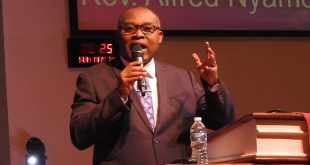
By James Quansah, Pastor
NEARLY EVERYONE living on earth today came to see Christianity being practised with the Bible as its accepted authoritative Scripture. From it, we read about the beliefs, acts, practices and traditions of the early Christians. The early believers mainly followed the teachings of Christ Jesus and the foundational ministers of the gospel by the leading of the Holy Spirit alone.
A student of the Bible knows that those disciples, whether Jews or Gentiles, who followed Christ Jesus faithfully never celebrated festivals such as Christmas or Easter. They seem to have understood that Christians celebrate the birth and resurrection of Christ Jesus any time the gospel was preached. To them, they celebrated Christ every day as they preached about Christ Jesus everyday thereby making Him known.
Members of the Early Church also never addressed any of their ministers in any ecclesiastical titles such as Reverend, Archbishop or Cardinal. They never wore clerical collar, never wore any special priestly garments, pectoral crosses (chains) & rings to clericalise the Church or create divisions thereby making some of them first class Christians called clergy and second class Christians called laity.
Also, there is no evidence that they ever held vigil for the dead as they didn’t believe in purgatory and they never administered the marital vows which are done today. The Master, the Lord Jesus Christ, who called and commissioned them having given them gifts had never charged them to do any of the things aforementioned for their special recognition and exclusive self-exaltation and self-glorification.
Those ministers including Peter, Philip, Paul, Timothy and Stephen were simply used by the Spirit of Christ to preach the gospel to make disciples, baptize believers, heal the sick, perform miracles, fellowship, break bread, teach, fast, pray and give to the poor. These may be described as the traditions of the then church.
However, when the early Christian and today’s Christian practices and traditions are juxtaposed and diligently assessed, one can easily see that great changes have occurred between them. Though there seems to be some similarities between the early and today’s Christianity, great differences also exist between them.
A careful observation of the practices of today’s Christianity clearly shows that the teachings of Christ and that of the foundational ministers which are found in Scripture are mixed with various established traditions of men introduced in Europe between 13th Century and 18th Century and beyond.
Thus, in the modern Christianity, festivals like Christmas and Easter are celebrated among several denominations. Also, honourific titles such as Pope, Cardinal, Vicar, Reverend, Archbishop which have no biblical basis are used by ordained ministers. Most pastors in this form of Christianity also wear priestly garments/ vestments, clerical collars with chains & rings which ministers of the Early Church rarely used.
There is no doubt that no minister in the Early Church ever used honourific titles attached to their names. Thus, Alexander Strauch points out that “ The modern array of titles attached to the names of most Christian leaders—- reverend, archbishop, cardinal, pope, primate, metropolitan, vicar…are completely missing from the New Testament and would have appalled the apostles and early believers.”
Now, it is important to stress that it is these traditions that have helped the evil of clericalism to gain deeper root in the modern church. Clericalism is a form of elitism in the church in which ordained ministers see themselves as special or superior to other Christian believers. This is something that never took place in the Early Church.
Moreover, in most denominations in today’s Christianity, only Reverend ordained ministers are permitted to administer the Eucharist, baptize believers, officiate marriage ceremonies, administer marital vows, and offficiate funeral/burial services among others. However, in the Early Church, disciples of Christ Jesus had the right to baptise believers (John 4:2).
Most modern-day ministers aggressively defend these things and practices and call them church traditions. Of course, they are church traditions, but is the Church of God built on Christ or man? It is not surprising that such traditions had no place or were never practised in the Early Church. Consequently, these things have no basis in Scripture.
Now, should true church traditions be established based on the commandments of God which are found in Scripture or teachings of men without scriptural authority? Sadly, most of these traditions are forced on ministers as Christianity spreads. They are also copied blindly from the teachings and appearances of some denominational leaders often through television, books, films and Internet today.
There is no doubt that these church traditions which have no basis in Scripture were introduced by modern Christian leaders to make them appear self-distinguished, self-exalted and self-important than the rest of the baptized believers in order to lord over them against the Word of God. (1 Peter 5: 3, 2 Corinthians 1:24, 2 Corinthians 4:5, Matthew 23:8).
James Quansah is the Executive Director of Christ-Conscious Leadership Centre (CLC) and lead Pastor of End-Time Christ’s Commissioners (ECC), Kumasi, Ghana. James is also a journalist by profession. He is married with four children.
 clcgh.org Building The Capacity Of Christian Leaders, Equipping The Saints For The Work Of Ministry, Redirecting Straying Christians To The Sound Knowledge Of Christ
clcgh.org Building The Capacity Of Christian Leaders, Equipping The Saints For The Work Of Ministry, Redirecting Straying Christians To The Sound Knowledge Of Christ



